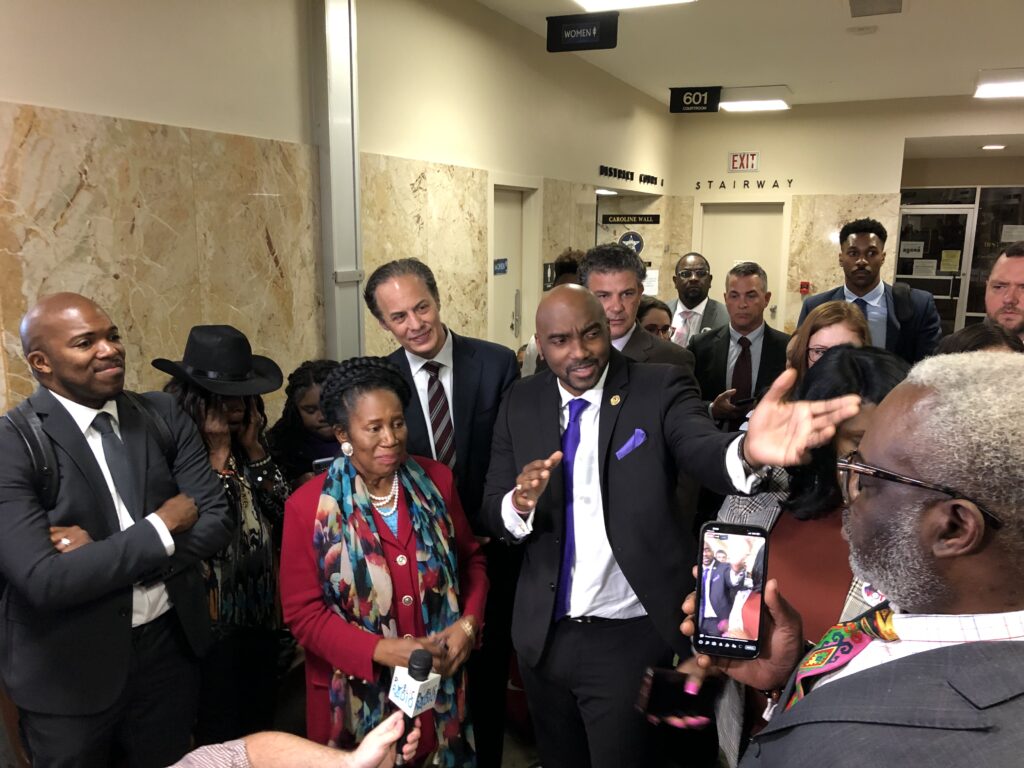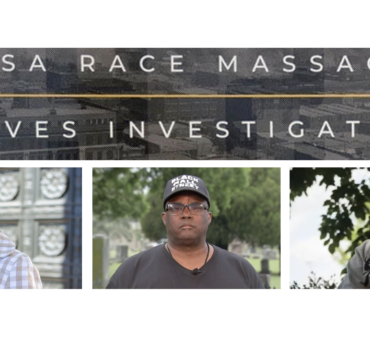Judge dismisses descendants from 1921 Tulsa Race Massacre case
GARY LEE
A Tulsa County District Court judge has dismissed the claims of eight plaintiffs who sought redress for the losses suffered during the century-old 1921 Tulsa Race Massacre and the ongoing affects throughout the decades that followed.
In a long-awaited order released on Wednesday, August 3, Tulsa County District Judge Caroline Wall concluded that the eight plaintiffs could not be included as parties in a lawsuit that survivors and descendants of victims of the Race Massacre are pursuing.
At the same time, Wall affirmed the Justice for Greenwood Foundation’s legal argument that the case of the three surviving race massacre – Lessie Benningfield Randle, 107; Viola Fletcher, 108; and Hughes Van Ellis Sr., 101, going could go forward.
Judge Wall’s order marked the first time that a lawsuit related to the Race Massacre can proceed. A series of lawsuits filed in 1922 and in 2003 were ultimately dismissed by the courts.
“The Court’s ruling is historic,” said Sara Solfanelli, special counsel for pro bono initiatives at Schulte Roth & Zabel, who is assisting Greenwood for Justice in the lawsuit. “This victory not only recognizes that the Massacre was a devastating attack on the Black community 100 years ago but clears the path for our clients to prove that it was also a public nuisance that continues to harm the community today.”
Tulsa attorney Damario Solomon-Simmons, who has been the legal voice for the three survivors and is the founder and executive director of the Justice for Greenwood Foundation, said the order allows them to move forward in their fight.
“The Massacre deprived Black Tulsans of our sense of security, hard-won economic power and vibrant community and created a nuisance that continues to this day,” Solomon-Simmons said. “The nuisance has led to the continued destruction of life and property in Greenwood in every quality-of-life metric—life expectancy, health, unemployment, education level, and financial security.”
The plaintiffs dismissed by Judge Wall in the lawsuit include six descendants of victims of the Race Massacre: Laurel Stradford, Ellouise Cochrane-Price, Tedra Williams, Don M. Adams, Don W. Adams, and Stephen Williams. In addition, Historic Vernon A.M.E. Church, Inc., and The Tulsa African Ancestral Society were also denied inclusion in the case. The eight parties had initially joined the three living survivors of the Race Massacre in filing the lawsuit in 2020.
The plaintiffs charged that the seven defendants – the City of Tulsa, Tulsa Development Authority, Tulsa Metropolitan Area Planning Commission, Board of County Commissioners for Tulsa County, Tulsa Regional Chamber, Vic Regalado in his role as Tulsa County Sheriff and the Oklahoma Military Department – were responsible for damages caused by the Race Massacre, the 18-hour brutal attack from May 31 to June 1, 1921, by a white mob against Black residents of the thriving Greenwood community. As many as 300 people were murdered and more than 1,200 homes destroyed in the 40-square-block area. The violence caused an estimated $200 million in damages in today’s dollars, according to Justice for Greenwood.

Public Nuisance Charge Rejected
In another blow to the valiant pursuit for justice by a cadre of Black Tulsans impacted by the Race Massacre’s legacy, Judge Wall rejected the claim of “ongoing” public nuisance, which sought abatement for events in the decades that followed the Race Massacre. The public nuisance argument was crafted by the defense team for the lawsuit as an attempt to maneuver beyond earlier rejections of claims made by descendants of the Race Massacre.
In her brief, Wall suggested that Oklahoma state executives and lawmakers should decide grievances by descendants of the Race Massacre.
“This court declines to engage in the management of public policy matters that should be dealt with by the legislative and executive branches,” she wrote.
Apart from a public apology that Tulsa Mayor G.T Bynum made in May of 2021, Oklahoma authorities have pushed back aggressively over the years against assuming responsibility for the massacre and its aftermath.
While Judge Wall’s extensive directive offers hope that survivors of the massacre could eventually obtain some form of legal remedy, it appears to follow a pattern of push back against the attempts that victims of the Race Massacre and their descendants have sought for over a century for acknowledgement and restitution for the destruction of the Greenwood. Simply stated, justice for Tulsa communities that continue to struggle to survive in the wake of more than one-hundred years of economic and societal racism will not be achieved via Oklahoma’s courts.
But the lawyers for the survivors and descendants said Judge Wall’s order is a step in a long process bending towards justice.
“For the first time in over 100 years, the last three living survivors of the Tulsa Race Massacre will finally have an opportunity to hold accountable the institutions that instigated and facilitated one of the worst acts of domestic terrorism in this country’s history,” said Michael Swartz, co-head of Schulte Roth & Zabel’s litigation group.
“While we are excited about the Court’s historic ruling, this case is by no means over. We believe that discovery will unearth more facts of what truly happened at the Massacre; the plaintiffs and the public deserve a deeper understanding of the events and their aftermath, and a more accurate historical record,” he said.
The survivors and descendants have sought reparations through the courts before. In 2005, the U.S. Supreme Court declined to hear an appeal from race massacre victims. The court rejected the case without comment, effectively affirming decisions by two lower federal courts that victims waited too long to file claims.
Last year, the three survivors testified before the U.S. House Judiciary Subcommittee on the Constitution, Civil Rights, and Civil Liberties to plead their case.
“I am 107 years old, and I have never … seen justice. I pray that one day I will,” Fletcher testified at the May 19, 2021, hearing on “Continuing Injustice: The Centennial of the Tulsa-Greenwood Race Massacre.”
“I have been blessed with a long life and have seen the best and the worst of this country. I think about the terror inflicted upon Black people in this country every day.”
New lawsuit first brought in 2020
Judge Wall’s brief gave the reasoning behind an announcement she made on May 3 that the survivors’ lawsuit could go forward. At the time, the survivors, their legal team and supporters, and the greater Black Tulsa community celebrated the decision as a victory for all those seeking justice for the massacre.
The plaintiffs initially brought the lawsuit in 2020. It is the latest in a decades long fight for justice for issues caused by the Race Massacre that the survivors and descendants of victims of the Race Massacre have fought. It named the City of Tulsa and other parties as defendants, arguing that they were complicit in the massacre and should be held responsible.
The suit demanded that the plaintiffs provide reparations, including unspecified punitive damages and the creation of a hospital in North Tulsa, in addition to mental health and education programs and a Tulsa Massacre Victims Compensation Fund.
It identified seven entities or organizations that were directly involved in the massacre, including the city, county, state National Guard and Tulsa Chamber of Commerce.
“The city police department and the county sheriff’s office deputized and armed white Tulsans to murder, loot, and burn the nearly 40 city blocks of the Greenwood District,” the suit said.
“The State National Guard participated with this angry white mob in killing and looting and destroying the property of Black residents of Greenwood. The city, sheriff, chamber, and county targeted Black community leaders and victims of the massacre for prosecution as instigators of the massacre — despite knowing who were truly responsible.”
The lawsuit accuses the Tulsa Chamber of joining with other officials after the massacre to impose martial law and round up survivors into “internment camps, only releasing them to work if sponsored by white employers.”
The City of Tulsa and other defendants, who could eventually be ordered to pay millions in damages, have battled hard to have the case dismissed. With the public statement that Judge Wall made in May and the detailed brief that she issued last week she batted back calls to kill the case. Her decision represents a measured success for the Race Massacre survivors
Judge Wall’s order said that the court found that the survivors established standing to sue. It noted that “a private person may maintain an action for a public nuisance if it is especially injurious to himself, but not otherwise.”
“The court finds Plaintiffs Randle, Fletcher and Van Ellis Sr. meet this statutory criteria,” Wall wrote.
Setbacks in the fight for justice
At the same time, last week’s opinion constitutes several major setbacks for the Justice For Greenwood movement. The majority of plaintiffs were dismissed. The argument that the events subsequent to the Race Massacre constitutes an ongoing public nuisance was also rebuffed. And the Tulsa Development Authority and the Tulsa Metropolitan Area Planning Commission were also rejected as defendants because they did not exist in 1921. Even in allowing the survivors’ lawsuit to go forward, Judge Wall established boundaries on the way they can frame their case.
Solomon-Simmons and other members of the legal team representing the case used an Aug. 4, press conference to depict Wall’s brief from the most positive perspective. “Bottom line is that survivors are in, we have the opportunity to prove the massacre itself … constitutes a nuisance,” said Solomon-Simmons in the conference.
He said that the Race Massacre deprived Black people in Tulsa of security, economic power and vibrant community.
“We look forward to proving our case around the massacre’s ongoing catastrophic effects and demonstrating the actions that defendants must take to repair and rebuild the Greenwood community during our clients’ lifetimes,” Solomon-Simmons said.
He added that he has spoken with those who were dismissed from the lawsuit.
“They were saddened they were dismissed out, but they are still very excited, heartened by the fact that we are moving forward and that these survivors can represent the entire community of Greenwood,” Solomon-Simmons said.
Judge Wall’s order calls for attorneys on both sides to amend their positions on reparations. The court dismissed the plea for unjust enrichment that the plaintiffs made. But she gave the three remaining plaintiffs an opportunity to file an amended petition. The court also granted leave for the plaintiffs to amend their petition to attempt to replead an abatement remedy.
Both sides have until Sept. 2 to reframe their positions.








